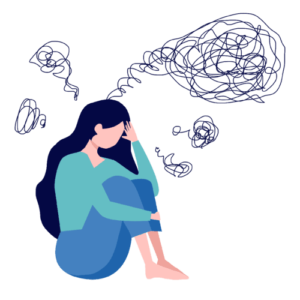
Unstuck OCD Assessment
Answer these simple questions to understand more about your Unstuck OCD Assessment. We share instant results and keep your information confidential.

What is Unstuck OCD Assessment?
The Unstuck OCD Assessment is a diagnostic tool designed to evaluate and measure the severity of Obsessive-Compulsive Disorder (OCD). It assists mental health professionals in assessing the presence of obsessive thoughts and compulsive behaviors, as well as gauging the impact of these symptoms on an individual’s daily life. This assessment aids in identifying the specific nature and intensity of OCD symptoms, which in turn helps guide treatment planning and interventions for individuals struggling with OCD.
Who can benefit from this Unstuck OCD Assessment?
The Unstuck OCD Assessment can benefit individuals who suspect they might be struggling with obsessive-compulsive disorder (OCD). This assessment is designed to help anyone experiencing distressing and intrusive thoughts, as well as repetitive behaviors that impact daily life. It offers a valuable resource for gaining insights into OCD symptoms, promoting self-awareness, and facilitating informed discussions with mental health professionals. This assessment can aid those seeking clarity about their experiences and guide them toward appropriate support and treatment options.


Unstuck OCD Assessment Accuracy
The accuracy of an “Unstuck OCD Assessment” would depend on the validity and reliability of the assessment tool used. Validity ensures that the assessment measures what it intends to, while reliability ensures consistent results over time. For accurate results, the assessment should be developed using rigorous scientific methods, validated against established criteria, and tested for consistency. Additionally, professional interpretation of the results is crucial for accurate diagnosis and appropriate guidance.
Types of Unstuck OCD Assessment
Structured Clinical Interviews:
Mental health professionals often use structured clinical interviews like the Yale-Brown Obsessive Compulsive Scale (Y-BOCS) or the Structured Clinical Interview for OCD (SCID-5) to assess the presence and severity of OCD symptoms, including those specific to Unstuck OCD.
Clinical Assessments:
Mental health professionals may use their clinical judgment to assess the specific obsessions and compulsions experienced by the individual. They would evaluate the content of obsessions related to feeling stuck, the impact on daily functioning, and the strategies individuals use to cope with their distress.
Diagnostic Criteria:
Clinicians use the Diagnostic and Statistical Manual of Mental Disorders (DSM-5) criteria to diagnose OCD, including Unstuck OCD. This involves assessing whether an individual meets the specific criteria for OCD, including the presence of obsessions and compulsions that cause significant distress or impairment.
Functional Assessments:
Assessments may involve evaluating the impact of Unstuck OCD on an individual’s daily life, including work, relationships, and other activities. This can help gauge the severity and impairment caused by the condition.
Behavioral Observations:
In some cases, clinicians might conduct behavioral observations to directly observe the obsessions and compulsions related to feeling stuck. This can provide valuable insights into the nature and severity of the symptoms.
Psychological Testing:
Comprehensive psychological testing may be conducted to assess various aspects of an individual’s cognitive and emotional functioning, which can help provide a clearer picture of their overall mental health, including Unstuck OCD symptoms.
Handling Unstuck OCD Issues
Handling issues related to Obsessive-Compulsive Disorder (OCD) can be challenging, but there are effective strategies and approaches that can help. It’s important to note that I’m not a substitute for professional medical advice. If you or someone you know is struggling with OCD, it’s recommended to seek guidance from a qualified mental health professional. However, I can provide some general suggestions that might be helpful:
- Education: Learn about OCD to better understand the nature of the disorder. Understanding that OCD is driven by irrational thoughts (obsessions) and repetitive behaviors (compulsions) can help reduce stigma and increase empathy.
- Therapy: Cognitive Behavioral Therapy (CBT) is a well-established and effective approach for treating OCD. Exposure and Response Prevention (ERP), a specific type of CBT, involves gradually facing and resisting OCD-related triggers and reducing the compulsive behaviors. ERP helps desensitize the anxiety associated with the obsessions.
- Medication: Some individuals with OCD benefit from medication, particularly selective serotonin reuptake inhibitors (SSRIs). Consult a psychiatrist for a proper evaluation and recommendation.
- Mindfulness and Meditation: Mindfulness practices can help increase awareness of thoughts and feelings without reacting to them. This can be particularly helpful for managing the distress associated with OCD.
- Distraction Techniques: Engaging in activities that capture your attention and focus can help reduce the time spent on obsessions and compulsions.
- Support System: Share your struggles with trusted friends and family members. Having a support system can help alleviate feelings of isolation.
- Set Realistic Goals: Set achievable goals for reducing compulsive behaviors. Gradually decreasing the frequency and intensity of these behaviors can be more effective than trying to stop them all at once.
- Journaling: Keep a journal to track your obsessive thoughts and compulsive behaviors. This can help you identify patterns and triggers, which is valuable information for therapy.
- Healthy Lifestyle: Regular exercise, proper sleep, and a balanced diet can contribute to overall mental health and well-being.
- Avoidance Reduction: Gradually face situations that trigger your obsessions instead of avoiding them. This can be part of the exposure process in therapy.
- Patience and Persistence: Recovery from OCD takes time and effort. Be patient with yourself and recognize that setbacks are a normal part of the journey.
- Professional Help: A licensed therapist or psychiatrist who specializes in treating OCD can provide tailored strategies and guidance based on your individual needs.
Remember that what works best for one person might not work the same way for another. It’s important to find a combination of strategies that suits you and your unique situation. Seek professional guidance to create a comprehensive treatment plan that addresses your specific challenges.